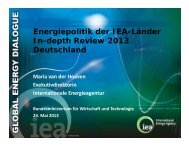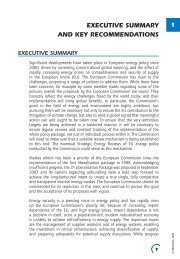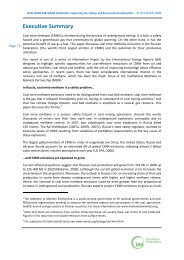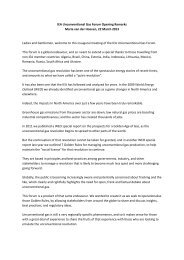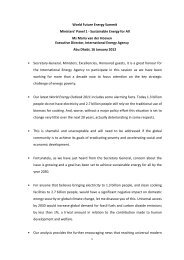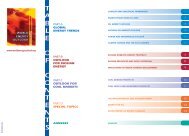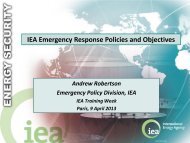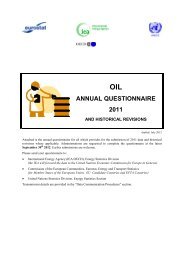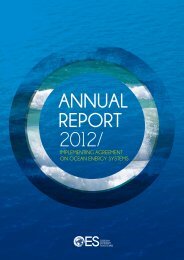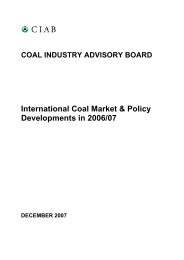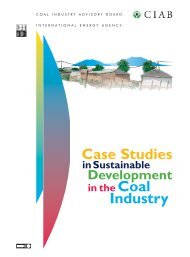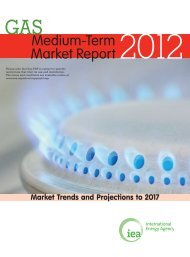Fabio Tambone - IEA
Fabio Tambone - IEA
Fabio Tambone - IEA
Create successful ePaper yourself
Turn your PDF publications into a flip-book with our unique Google optimized e-Paper software.
The Key Role of Energy<br />
Regulation in the<br />
Mediterranean<br />
Region<br />
<strong>Fabio</strong> <strong>Tambone</strong><br />
MEDREG General Coordinator<br />
From Mediterranean Plans to RE Power Plants<br />
Rome, October 3, 2012<br />
International Energy Agency Conference
MEDREG<br />
• MEDREG was launched in 2006 as a voluntary Working Group,<br />
and became a formal Association in 2007<br />
• MEDREG gathers Energy Regulators of 20 countries of the<br />
Mediterranean basin to promote a clear, stable and harmonized<br />
legal and regulatory framework in the Mediterranean region<br />
• MEDREG Secretariat is located in Milan, hosted by the Italian<br />
Regulatory Authority for Electricity and Gas (AEEG)<br />
• MEDREG benefits from the support of the European Union, and of<br />
the Council of European Energy Regulators (CEER) and of its<br />
members.<br />
MEDREG is supported by the European Union<br />
3
Membership
Organization Chart<br />
MEDREG is supported by the European Union 4
Mission<br />
• To promote a greater harmonization of the energy markets and<br />
legislations and to seek progressive market integration in the Euro-<br />
Mediterranean region<br />
• To foster sustainable development in the energy sector through greater<br />
efficiency and integration of energy markets based on secure, safe, costeffective<br />
and environmentally sustainable energy systems<br />
• To support initiatives of common interest in key areas such as<br />
infrastructure development, investment financing and research<br />
• To provide capacity building activities through working groups, training,<br />
session and seminars<br />
• To foster co-operation, information exchange and assistance among<br />
members providing a permanent discussion framework<br />
MEDREG is supported by the European Union<br />
3
A new approach<br />
to Mediterranean energy challenges<br />
• Context of strategic energy challenges of the Mediterranean region:<br />
necessity to conciliate a rising energy demand with sustainable<br />
development conditions<br />
• Mediterranean Energy Regulators consider as a priority to constitute a<br />
strong institutional basis promoting a “bottom up“ approach towards<br />
energy markets integration<br />
• These objectives require<br />
• A long term vision, as continuous efforts are necessary to achieve a<br />
converging and coherent regulatory framework through a step-by-step<br />
approach (e.g IMME Action Plan 2010-2015)<br />
• Designed at regional level, including regional targets<br />
5
Towards a<br />
Mediterranean Energy Community<br />
• MEDREG would provide technical and regulatory support to national<br />
and regional actors, including governments, parliaments, local<br />
authorities, UfM, institutional investors, and regional associations (TSO’s,<br />
operators, consumers)<br />
• These activities would enhance the creation of an effective and well<br />
consolidated Mediterranean Energy network, strengthening inter alia<br />
the role and visibility of the Mediterranean Energy Forum launched by the<br />
European Commission<br />
• With the aim to support the creation of a Mediterranean Energy<br />
Community by 2020 involving all stakeholders of the energy sector<br />
6
Accountability<br />
• Involvement of all actors of the Mediterranean energy area: national and regional<br />
stakeholders of the energy sector, such as governments, parliaments, financial<br />
institutions, TSOs, industrial and consumers’ associations, think tanks<br />
• Explicit political endorsement as point of reference for energy regulation at<br />
regional level (Declaration of the Euro-Mediterranean Energy Ministers meeting,<br />
Limassol 2007; Declaration of the Euro-Mediterranean Foreign Affairs Ministers meeting,<br />
Marseille 2008; “G8+ Energy Regulators Round Table”, Rome 2009)<br />
• Identification as one of the key actors for energy cooperation and market<br />
integration in the region (by the ITRE Committee of the European Parliament in a 2011<br />
report on the “Energy Strategy in the Southern Mediterranean”, and by the United<br />
Nations in its “13 th meeting on Oceans and the Law of the Sea on Marine Renewable<br />
Energy” in May 2012, when MEDREG pivotal role in the Mediterranean energy<br />
framework was acknowledged and strongly supported in view of its constitution as a<br />
permanent organization)<br />
• Acknowledgment by the EC in its June 2012 Communication on “Renewable energy”<br />
of the role of MEDREG in the implementation of the RES Directive, and in particular<br />
North-South energy exchange.<br />
7
Network<br />
MEDREG is supported by the European Union<br />
8
Progressive harmonisation as a condition for<br />
market integration 1/2<br />
• Stability and transparency of energy markets design and<br />
organization<br />
• Progressive opening to competition, according to each national<br />
situation and targets<br />
• Separate entities for energy generation, transmission, distribution and<br />
supply (public or private)<br />
• Implementation of clear and stable support schemes for RES and EE,<br />
including transparent, realistic and detailed targets at national AND<br />
regional level for each category of RES and EE measure<br />
• Define a “policy path” towards a coherent and more and more<br />
coordinated approach in the Mediterranean region<br />
• Through progressive harmonization<br />
• Respecting national specificities<br />
11
Progressive harmonisation as a condition for<br />
stronger investments 2/2<br />
• Non-refundable subsidies (grants and concessional loans) should be<br />
accompained by private initiatives (e.g., private equity)<br />
• Innovative financial instruments targeted at specific projects (e.g.,<br />
sophisticated hedging instruments and derivatives trading to promote<br />
liquidity)<br />
• Need for coordination among different regional inititiatives:<br />
• MED-TSO<br />
• Desertec<br />
• Union for the Mediterranean (UPM)<br />
• European Investment Bank (EIB)<br />
• European Bank for Reconstruction and Development (EBRD),<br />
• MedGrid<br />
• RES4MED<br />
• African Development Bank<br />
• World Bank<br />
• InfraMed<br />
12
Challenges to RES Development<br />
Political<br />
• Weak and unstable<br />
legislative<br />
framework<br />
• Geopolitical barriers<br />
• Lack of experience<br />
in the policies of<br />
green energy<br />
promotion<br />
Economic and<br />
Financial<br />
• Lack of incentives<br />
• Instable and/or<br />
absent electricity<br />
supply (with<br />
subsequent blackouts<br />
and areas<br />
unserved by the<br />
electricity network<br />
• Low level of<br />
investments in new<br />
projects<br />
• Inability to foresee<br />
the expected return<br />
of investments<br />
• Difficulties in<br />
accessing to credit<br />
Technological<br />
• Insufficient<br />
information and<br />
technological knowhow<br />
(lack of adequate<br />
personnel and poor<br />
connections between<br />
research and<br />
development<br />
institutions and<br />
commercial networks)<br />
• Insufficient network<br />
capacity to integrate<br />
RES plants<br />
10
Proposed Regulatory Solutions for RES<br />
integration<br />
‣ Identify a national contact or coordination authorities on crossborder<br />
trade and transit mechanisms<br />
‣ Define non-discriminatory access rules and priority of dispatch<br />
‣ RES integration in the grids<br />
‣ Progressive market integration and energy exchanges at<br />
subregional and regional lavel, then into the EU SingleEnergy<br />
Market<br />
MEDREG is supported by the European Union 1<br />
3
Conclusion<br />
‣Strategic role of Regulators in favour of economic, social and<br />
sustainable development to benefit of all consumers in the<br />
Mediterranean Basin<br />
‣Need for ambitious objectives for a stable, operational and shared<br />
regulatory framework at regional level<br />
‣Regional targets in every sector to build the action of all stakeholders in<br />
the long run<br />
‣Implementation through a “bottom-up” and step-by-step approach<br />
including realistic and harmonised targets
Thank you for your attention<br />
<strong>Fabio</strong> <strong>Tambone</strong><br />
MEDREG General Coordinator<br />
Piazza Cavour, 5<br />
20121 Milano (IT)<br />
Tel: +39.02.65565.291<br />
Fax: +39.02.65565.342<br />
E-mail: ftambone@autorita.energia.it<br />
www.medreg-regulators.org<br />
MEDREG is supported by the European Union




